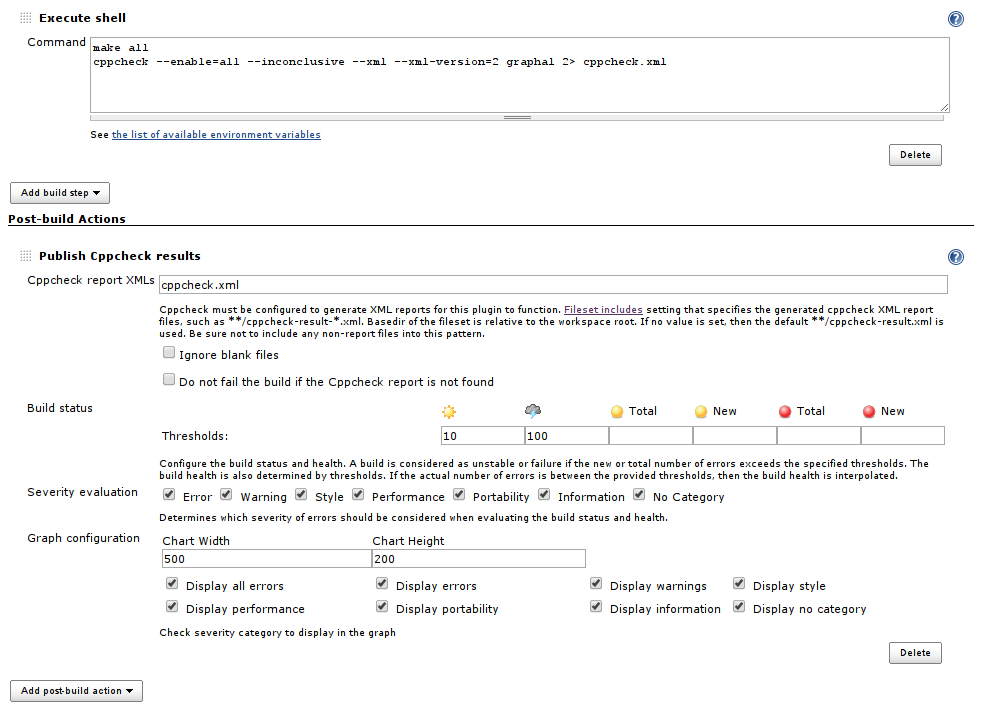This plugin generates the trend report for CppCheck, a tool for static C/C++ code analysis.
The Cppcheck plug-in scans for Cppcheck report files in the build workspace and reports the issues detected during static C/C++ code analysis.
The following features are provided by this plug-in:
- Configuration of the files to scan after a build, build status evaluation and graph.
- Trend reports showing the number of detected issues per type.
- Results summary and results details including new issues and solved issues.
- Listing of source code with highlighted issues.
- Show all violations highlighted on a single page.
- Dashboard View portlet showing number of issues per job.
- Remote access API (REST API).
- Works with most project/job types.
Please use the Mailing Lists or issue tracker to ask questions, create feature request or bug reports.
- Install Cppcheck tool to the system. If you use master Jenkins server and several build slaves, install it to all slaves that will run the analysis.
- For each job configuration page:
- Add Execute shell build step to generate Cppcheck report or create the report file in your build scripts (Ant, Maven, Make, ...).
- Activate Publish Cppcheck results in Post-build Actions and provide at least the path to the generated Cppcheck report (
cppcheck.xml). - Optionally configure build status evaluation (Advanced button).
- Optionally configure graph (second level Advanced button).
- Always prefer new XML version 2 for the output format. XML version 1 is supported in the plugin too, but Cppcheck doesn't report some issues with the legacy format.
# Minimal set of arguments
cppcheck --xml --xml-version=2 SOURCE_DIRECTORY 2> cppcheck.xml
# Enable all checks
cppcheck --enable=all --inconclusive --xml --xml-version=2 SOURCE_DIRECTORY 2> cppcheck.xml
# Analysis in multiple parallel threads
cppcheck -j 4 --enable=all --inconclusive --xml --xml-version=2 SOURCE_DIRECTORY 2> cppcheck.xml
The plugin expects that all paths in the input report file (cppcheck.xml) are relative to the workspace root directory. If the Cppcheck tool is executed from a sub-directory, the plugin will be unable to pair the paths in the report with the files on disk and the source codes with the highlighted errors won't be available in the details.
# In the workspace root directory
cd SUBDIRECTORY
cppcheck --enable=all --inconclusive --xml --xml-version=2 INPUT_DIRECTORY 2> cppcheck.xml
See the warning in the Console Output below. The invalid absolute path is missing SUBDIRECTORY between workspace and INPUT_DIRECTORY directories.
[Cppcheck] Starting the cppcheck analysis.
[Cppcheck] Processing 1 files with the pattern '**/cppcheck.xml'.
[Cppcheck] [WARNING] - The source file 'file:/SHORTENED/work/jobs/JOB_NAME/workspace/INPUT_DIRECTORY/mainwindow.cpp'
doesn't exist on the slave. The ability to display its source code has been removed.
...
There are basically two solutions for this issue. The first one is to execute the Cppcheck analysis directly from the workspace root directory to make SUBDIRECTORY part of the path.
# In the workspace root directory
# cd SUBDIRECTORY
# cppcheck --enable=all --inconclusive --xml --xml-version=2 INPUT_DIRECTORY 2> cppcheck.xml
cppcheck --enable=all --inconclusive --xml --xml-version=2 SUBDIRECTORY/INPUT_DIRECTORY 2> SUBDIRECTORY/cppcheck.xml
But the above solution is not much suitable for larger projects that are using for example recursive GNU/Make based build scripts where the Cppcheck analysis is executed for each sub-project (sub-directory). It is better to modify the paths in the report files after they are created.
# In the workspace root directory
cd SUBDIRECTORY
cppcheck --enable=all --inconclusive --xml --xml-version=2 INPUT_DIRECTORY 2> cppcheck.xml
sed -i 's%\(<location file="\)%\1SUBDIRECTORY/%' cppcheck.xml
The sed command above adds SUBDIRECTORY/ to the beginning of the paths in the location elements. Note this method is not limited only to sed, you can use whatever tool that is able to replace string in a file.
<location file="INPUT_DIRECTORY/mainwindow.cpp" line="1134"/>
<location file="SUBDIRECTORY/INPUT_DIRECTORY/mainwindow.cpp" line="1134"/>
Remote access API (REST API)
Use the URLs below to access the Cppcheck specific data.
Description of possibilities
Data
- http://SERVER/job/JOB_NAME/BUILD_NUMBER/cppcheckResult/api/xml
- http://SERVER/job/JOB_NAME/BUILD_NUMBER/cppcheckResult/api/json
- etc.
Example of XML data:
<cppcheckStatistics>
<numberErrorSeverity>0</numberErrorSeverity>
<numberInformationSeverity>7</numberInformationSeverity>
<numberNoCategorySeverity>0</numberNoCategorySeverity>
<numberPerformanceSeverity>20</numberPerformanceSeverity>
<numberPortabilitySeverity>0</numberPortabilitySeverity>
<numberStyleSeverity>22</numberStyleSeverity>
<numberTotal>54</numberTotal>
<numberWarningSeverity>5</numberWarningSeverity>
</cppcheckStatistics>
Example of JSON data:
{
"numberErrorSeverity" : 0,
"numberInformationSeverity" : 7,
"numberNoCategorySeverity" : 0,
"numberPerformanceSeverity" : 20,
"numberPortabilitySeverity" : 0,
"numberStyleSeverity" : 22,
"numberTotal" : 54,
"numberWarningSeverity" : 5
}
